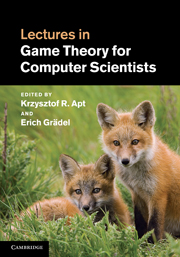Book contents
- Frontmatter
- Contents
- List of contributors
- Preface
- 1 A Primer on Strategic Games
- 2 Infinite Games and Automata Theory
- 3 Algorithms for Solving Parity Games
- 4 Back and Forth Between Logic and Games
- 5 Turn-Based Stochastic Games
- 6 Games with Imperfect Information: Theory and Algorithms
- 7 Graph Searching Games
- 8 Beyond Nash Equilibrium: Solution Concepts for the 21st Century
- Index
2 - Infinite Games and Automata Theory
Published online by Cambridge University Press: 01 June 2011
- Frontmatter
- Contents
- List of contributors
- Preface
- 1 A Primer on Strategic Games
- 2 Infinite Games and Automata Theory
- 3 Algorithms for Solving Parity Games
- 4 Back and Forth Between Logic and Games
- 5 Turn-Based Stochastic Games
- 6 Games with Imperfect Information: Theory and Algorithms
- 7 Graph Searching Games
- 8 Beyond Nash Equilibrium: Solution Concepts for the 21st Century
- Index
Summary
Abstract
This chapter gives an introduction to the connection between automata theory and the theory of two player games of infinite duration. We illustrate how the theory of automata on infinite words can be used to solve games with complex winning conditions, for example specified by logical formulae. Conversely, infinite games are a useful tool to solve problems for automata on infinite trees such as complementation and the emptiness test.
Introduction
The aim of this chapter is to explain some interesting connections between automata theory and games of infinite duration. The context in which these connections have been established is the problem of automatic circuit synthesis from specifications, as posed by Church [1962]. A circuit can be viewed as a device that transforms input sequences of bit vectors into output sequences of bit vectors. If the circuit acts as a kind of control device, then these sequences are assumed to be infinite because the computation should never halt.
The task in synthesis is to construct such a circuit based on a formal specification describing the desired input/output behaviour. This problem setting can be viewed as a game of infinite duration between two players: The first player provides the bit vectors for the input, and the second player produces the output bit vectors. The winning condition of the game is given by the specification. The goal is to find a strategy for the second player such that all pairs of input/output sequences that can be produced according to the strategy satisfy the specification.
- Type
- Chapter
- Information
- Lectures in Game Theory for Computer Scientists , pp. 38 - 73Publisher: Cambridge University PressPrint publication year: 2011
- 3
- Cited by

